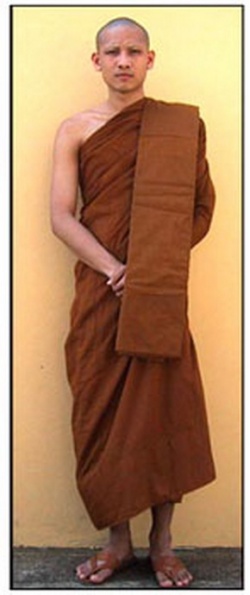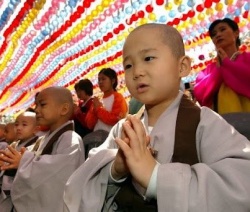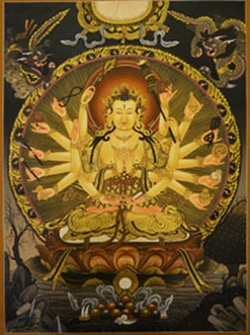Difference between revisions of "The Days of Hermits, Scoundrels, and a Dragon Princess"
(Created page with " <poem> Chapter 12 is the quintessential text in Buddhism conveying the all-encompassing ascendancy of Buddha-nature. It reveals that regardless of one’s moral s...") |
|||
| Line 1: | Line 1: | ||
| − | + | {{DisplayImages|2504|2128|3115|2569}} | |
<poem> | <poem> | ||
| − | Chapter 12 is the quintessential text in [[Buddhism]] conveying the all-encompassing ascendancy of [[Buddha-nature]]. It reveals that regardless of one’s [[moral]] stature, {{Wiki|sexual}} [[Wikipedia:Identity (social science)|identity]], or karmic-predispositions, the potential-seed of [[Buddhahood]] is indigenous to all [[sentient beings]]. The “[[awakening]]” to one’s [[Buddha-nature]] is fully developed in this Chapter known as “[[Devadatta]]” that is [[essentially]] comprised of two segments—the first concerning a notorious man and the second involving a young {{Wiki|female}}, both of whom secured their own [[realization]] of [[Buddhahood]]. It opens with the [[Buddha]] describing one of his previous [[existences]] when he was a discontented [[king]] who sought the [[doctrine]] of [[truth]]. He made it be known that he would become anyone’s servant who could reveal this Buddha-gnosis. A lowly [[hermit]] approaches him and conveys the importance of the [[Lotus Sutra]]. The [[king]] subsequently becomes the hermit’s personal-servant during which [[time]] he becomes [[enlightened]] to the teachings of the [[Sutra]]. The [[Buddha]] reveals that this [[hermit]] was non-other than [[Devadatta]] in a previous [[incarnation]]. [[Devadatta’s]] reputation was less than spectacular: | + | Chapter 12 is the quintessential text in [[Buddhism]] conveying the all-encompassing ascendancy of [[Buddha-nature]]. It reveals that regardless of one’s [[moral]] stature, {{Wiki|sexual}} [[Wikipedia:Identity (social science)|identity]], or karmic-predispositions, the potential-seed of [[Buddhahood]] is indigenous to all [[sentient beings]]. The “[[awakening]]” to one’s [[Buddha-nature]] is fully developed in this Chapter known as “[[Devadatta]]” that is [[essentially]] comprised of two segments—the first concerning a notorious man and the second involving a young {{Wiki|female}}, both of whom secured their own [[realization]] of [[Buddhahood]]. It opens with the [[Buddha]] describing one of his previous [[existences]] when he was a discontented [[king]] who sought the [[doctrine]] of [[truth]]. He made it be known that he would become anyone’s servant who could reveal this [[Buddha]]-gnosis. A lowly [[hermit]] approaches him and conveys the importance of the [[Lotus Sutra]]. The [[king]] subsequently becomes the hermit’s personal-servant during which [[time]] he becomes [[enlightened]] to the teachings of the [[Sutra]]. The [[Buddha]] reveals that this [[hermit]] was non-other than [[Devadatta]] in a previous [[incarnation]]. [[Devadatta’s]] reputation was less than spectacular: |
Although the chapter touches only on a {{Wiki|past}} [[lifetime]] of [[Devadatta]] and makes no reference to his {{Wiki|present}} [[Wikipedia:Identity (social science)|identity]] as the [[Buddha’s]] [[jealous]] cousin, [[Devadatta]] would have been well known to the sūtra’s early {{Wiki|devotees}} as the [[Buddhist]] {{Wiki|archetype}} of an evildoer. [[Devadatta]] is said to have incited his [[friend]], {{Wiki|Prince}} [[Ajātaśatru]], to kill his father, [[King Bimbisara]], who was the [[Buddha’s]] {{Wiki|patron}}, and usurp the [[throne]]. [[Devadatta]] also fomented dissension within the [[sangha]] and even attempted to kill the [[Buddha]]. In the context of the [[Lotus Sūtra]], with its [[teaching]] of the one [[vehicle]] and promise of [[buddhahood]] for everyone, this chapter became widely understood as illustrating the potential for [[enlightenment]] even in [[evil]] persons. | Although the chapter touches only on a {{Wiki|past}} [[lifetime]] of [[Devadatta]] and makes no reference to his {{Wiki|present}} [[Wikipedia:Identity (social science)|identity]] as the [[Buddha’s]] [[jealous]] cousin, [[Devadatta]] would have been well known to the sūtra’s early {{Wiki|devotees}} as the [[Buddhist]] {{Wiki|archetype}} of an evildoer. [[Devadatta]] is said to have incited his [[friend]], {{Wiki|Prince}} [[Ajātaśatru]], to kill his father, [[King Bimbisara]], who was the [[Buddha’s]] {{Wiki|patron}}, and usurp the [[throne]]. [[Devadatta]] also fomented dissension within the [[sangha]] and even attempted to kill the [[Buddha]]. In the context of the [[Lotus Sūtra]], with its [[teaching]] of the one [[vehicle]] and promise of [[buddhahood]] for everyone, this chapter became widely understood as illustrating the potential for [[enlightenment]] even in [[evil]] persons. | ||
| Line 9: | Line 9: | ||
Not only was [[Devadatta]] [[recognized]] and honored, he was later to become a [[Buddha]] himself: | Not only was [[Devadatta]] [[recognized]] and honored, he was later to become a [[Buddha]] himself: | ||
| − | The [[Buddha]] addressed the [[fourfold assembly]], saying: “After [[immeasurable]] [[kalpas]] have passed, [[Devadatta]] will then become a [[buddha]] called [[Devarāja]], a [[Tathāgata]], [[Arhat]], | + | The [[Buddha]] addressed the [[fourfold assembly]], saying: “After [[immeasurable]] [[kalpas]] have passed, [[Devadatta]] will then become a [[buddha]] called [[Devarāja]], a [[Tathāgata]], [[Arhat]], [[Completely Enlightened]], [[Perfect in Knowledge and Conduct]], [[Well-Departed]], [[Knower of the World]], [[Unsurpassed]], [[Tamer of Humans]], [[Teacher of Devas]] and [[Humans]], [[Buddha]], [[Bhagavat]]. His [[world]] will be called [[Deva]] so pānā. At that [[time]] the [[Buddha]] [[Devarāja]] will abide in the [[world]] for twenty [[intermediate]] [[kalpas]] and extensively teach the True [[Dharma]] to [[sentient beings]]. [[Sentient beings]] {{Wiki|equal}} in number to the sands of the [[Ganges River]] will attain [[arhatship]]. The [[thought]] of a [[pratyekabuddha]] has [[awakened]] in incalculable numbers of [[sentient beings]]. The [[thought]] of the [[highest]] [[path]] will [[awaken]] in [[sentient beings]] {{Wiki|equal}} in number to the sands of the [[Ganges River]], and they will become convinced of the [[nonarising]] of all [[dharmas]] and reside in the stage of nonretrogression. |
| − | In light of all this, it goes without saying that even a scoundrel, someone disloyal to the core, betraying the [[Buddha]] and all members of the [[Sangha]], could—if [[awakened]] to their own Buddha-nature—receive all the benefits afforded to spiritual-children of the [[Tathagata]]. This also conveys a radical skillfull-means employed heightening the [[awareness]] that the very nucleus of [[Buddha-nature]] is hidden even in the most ignominious regions of the [[human]] [[spirit]]. | + | In light of all this, it goes without saying that even a scoundrel, someone disloyal to the core, betraying the [[Buddha]] and all members of the [[Sangha]], could—if [[awakened]] to their own Buddha-nature—receive all the benefits afforded to spiritual-children of the [[Tathagata]]. This also conveys a radical [[skillfull-means]] employed heightening the [[awareness]] that the very nucleus of [[Buddha-nature]] is hidden even in the most ignominious regions of the [[human]] [[spirit]]. |
| − | The next segment of this chapter transmits a further—all inclusive—device revealing that [[Buddha-nature]] is never discriminatory but freely and uninhibitedly [[exists]] in all. The great [[Manjushri]] himself rises from the dragon-palace at the bottom of the sea (a wonderful {{Wiki|metaphor}} depicting that the greatest of all [[protectors]] of the [[Buddhadharma]] are the Mystical-Dragons, indeed the very {{Wiki|personification}} of [[Wisdom]] Itself) and imparts the beautiful story of the Dragon-Kings daughter: | + | The next segment of this chapter transmits a further—all inclusive—device revealing that [[Buddha-nature]] is never discriminatory but freely and uninhibitedly [[exists]] in all. The great [[Manjushri]] himself rises from the [[dragon]]-palace at the bottom of the sea (a wonderful {{Wiki|metaphor}} depicting that the greatest of all [[protectors]] of the [[Buddhadharma]] are the Mystical-Dragons, indeed the very {{Wiki|personification}} of [[Wisdom]] Itself) and imparts the beautiful story of the [[Dragon-Kings]] daughter: |
| − | There is the daughter of the [[nāga king]] | + | There is the daughter of the [[nāga king Sāgara]] who is only eight years old. She is [[wise]]; her [[faculties]] are sharp; and she also well [[knows]] all the [[faculties]] and [[deeds]] of [[sentient beings]]. She has [[attained]] the power of [[recollection]]. She preserves all the profound secret [[treasures]] taught by the [[buddhas]], enters deep [[meditation]], and is well capable of discerning all [[dharmas]]. She instantly produced the [[thought]] of [[enlightenment]] and [[attained]] the stage of nonretrogression. She has unhindered [[eloquence]] and [[thinks]] of [[sentient beings]] with as much [[compassion]] as if they were her own children. Her [[virtues]] are perfect. Her [[thoughts]] and explanations are {{Wiki|subtle}} and extensive, [[merciful]], and [[compassionate]]. She has a harmonious [[mind]] and has [[attained]] [[enlightenment]].” |
| − | The [[Bodhisattva]] Prajnākūṭa said: “I see the [[Tathāgata]] [[Śākyamuni]] who has been incessantly carrying out difficult and severe practices for [[immeasurable]] [[kalpas]], accumulating [[merit and virtue]] while seeking the [[bodhisattva path]]. Looking into the great manifold [[cosmos]], there is not a single place even the size of a mustard seed where this [[bodhisattva]] has not abandoned his [[life]] for the sake of [[sentient beings]]. He [[attained]] the [[path]] to [[enlightenment]] only after this. It is hard to believe that this girl will instantly attain [[complete enlightenment]].” | + | The [[Bodhisattva]] [[Prajnākūṭa]] said: “I see the [[Tathāgata]] [[Śākyamuni]] who has been incessantly carrying out difficult and severe practices for [[immeasurable]] [[kalpas]], accumulating [[merit and virtue]] while seeking the [[bodhisattva path]]. Looking into the great manifold [[cosmos]], there is not a single place even the size of a mustard seed where this [[bodhisattva]] has not abandoned his [[life]] for the sake of [[sentient beings]]. He [[attained]] the [[path]] to [[enlightenment]] only after this. It is hard to believe that this girl will instantly attain [[complete enlightenment]].” |
Before he had finished {{Wiki|speaking}} the daughter of the [[nāga king]] suddenly appeared in their presence… | Before he had finished {{Wiki|speaking}} the daughter of the [[nāga king]] suddenly appeared in their presence… | ||
| Line 25: | Line 25: | ||
“You say that you will soon attain the [[highest]] [[path]]. This is difficult to believe. Why is this? The {{Wiki|female}} [[body]] is polluted; it is not a fit vessel for the [[Dharma]]. How can you attain [[highest]] [[enlightenment]]? | “You say that you will soon attain the [[highest]] [[path]]. This is difficult to believe. Why is this? The {{Wiki|female}} [[body]] is polluted; it is not a fit vessel for the [[Dharma]]. How can you attain [[highest]] [[enlightenment]]? | ||
| − | “The [[buddha | + | “The [[buddha path]] is long. One can only attain it after diligently carrying out severe practices, and completely practicing the [[perfections]] over [[immeasurable]] [[kalpas]]. Moreover, the {{Wiki|female}} [[body]] has five obstructions. The first is the inability to become a great [[Brahma]]. The second is the inability to become [[Śakra]]. The third is the inability to become [[Māra]], and the fourth is the inability to become a [[universal monarch]] ([[cakravartin]]). The fifth is the inability to become a [[buddha]]. How can you with your {{Wiki|female}} [[body]] quickly become a [[buddha]]?” |
| − | Then the daughter of the [[nāga king]] presented to the [[Buddha]] a [[jewel]] worth the great manifold [[cosmos]], and the [[Buddha]] accepted it. The daughter of the [[nāga king]] spoke to [[Bodhisattva]] [[Prajnā]] | + | Then the daughter of the [[nāga king]] presented to the [[Buddha]] a [[jewel]] worth the great manifold [[cosmos]], and the [[Buddha]] accepted it. The daughter of the [[nāga king]] spoke to [[Bodhisattva]] [[Prajnā kūṭa]] and the [[noble]] [[Śāriputra]], saying: “I [[offered]] a [[jewel]] and the [[Bhagavat]] accepted it. Was that done quickly or not?” |
They answered, saying: “It was done extremely quickly!” | They answered, saying: “It was done extremely quickly!” | ||
| Line 35: | Line 35: | ||
Then the assembly there all saw the daughter of the [[nāga king]] instantly [[transform]] into a man, perfect the [[bodhisattva]] practices, go to the [[vimalā]] [[world]] in the [[south]], sit on a [[jeweled lotus]] [[flower]], and attain [[highest]], [[complete enlightenment]], become endowed with the [[thirty-two marks]] and eighty {{Wiki|excellent}} [[characteristics]], and expound the True [[Dharma]] universally for the sake of all [[sentient beings]] in the [[ten directions]]. | Then the assembly there all saw the daughter of the [[nāga king]] instantly [[transform]] into a man, perfect the [[bodhisattva]] practices, go to the [[vimalā]] [[world]] in the [[south]], sit on a [[jeweled lotus]] [[flower]], and attain [[highest]], [[complete enlightenment]], become endowed with the [[thirty-two marks]] and eighty {{Wiki|excellent}} [[characteristics]], and expound the True [[Dharma]] universally for the sake of all [[sentient beings]] in the [[ten directions]]. | ||
| − | Then the [[bodhisattvas]], [[śrāvakas]], eight kinds of [[devas]], [[nāgas]], and so on, [[humans]] and nonhumans of the [[sahā world]], all saw in the distance that the daughter of the [[nāga king]] had become a [[buddha]] and was universally [[teaching]] the [[Dharma]] for the sake of the [[humans]] and [[devas]] in that assembly. They rejoiced greatly and honored her from afar. | + | Then the [[bodhisattvas]], [[śrāvakas]], eight kinds of [[devas]], [[nāgas]], and so on, [[humans]] and [[nonhumans]] of the [[sahā world]], all saw in the distance that the daughter of the [[nāga king]] had become a [[buddha]] and was universally [[teaching]] the [[Dharma]] for the sake of the [[humans]] and [[devas]] in that assembly. They rejoiced greatly and honored her from afar. |
| − | In today’s [[understanding]] this story reveals that [[Buddhism]] is not sexist; although many have still questioned why this most [[wise]] daughter of the [[Dragon King]] had to [[transform]] her [[body]] into that of a man. What she did was clearly in keeping with the [[Buddhist]] prescriptions of the day that [[Buddhahood]] could only be [[attained]] in a male-form. Yet, it can also serve as a [[form]] of {{Wiki|poetic}} justice—she shows through her metamorphosis that she is equal—even {{Wiki|superior}} (simply through this [[miraculous]] action)—to her {{Wiki|male}} counterparts in the story. This is reminiscent of the story of the [[Goddess]] (Chapter 7) in the [[Vimalakirti Sutra]] who momentarily changes good ol’ sexist-Sariputra into a woman (her own [[form]]) while she transforms herself into his! Quite a twist indeed! The whole point of both stories is the [[teaching of the Buddha]] that when it comes to one’s own innate [[Buddha-nature]], there is neither {{Wiki|male}} nor {{Wiki|female}}. | + | In today’s [[understanding]] this story reveals that [[Buddhism]] is not sexist; although many have still questioned why this most [[wise]] daughter of the [[Dragon King]] had to [[transform]] her [[body]] into that of a man. What she did was clearly in keeping with the [[Buddhist]] prescriptions of the day that [[Buddhahood]] could only be [[attained]] in a male-form. Yet, it can also serve as a [[form]] of {{Wiki|poetic}} justice—she shows through her metamorphosis that she is equal—even {{Wiki|superior}} (simply through this [[miraculous]] action)—to her {{Wiki|male}} counterparts in the story. This is reminiscent of the story of the [[Goddess]] (Chapter 7) in the [[Vimalakirti Sutra]] who momentarily changes good ol’ sexist-[[Sariputra]] into a woman (her own [[form]]) while she transforms herself into his! Quite a twist indeed! The whole point of both stories is the [[teaching of the Buddha]] that when it comes to one’s own innate [[Buddha-nature]], there is neither {{Wiki|male}} nor {{Wiki|female}}. |
| − | *Also, in particular for a [[Naga]] ([[Dragon]]) {{Wiki|Princess}}, Buddha-gnosis (rooted in Bodhipower) is second [[nature]]. | + | *Also, in particular for a [[Naga]] ([[Dragon]]) {{Wiki|Princess}}, [[Buddha]]-gnosis (rooted in Bodhipower) is second [[nature]]. |
</poem> | </poem> | ||
{{R}} | {{R}} | ||
[http://unbornmind.com/myblog/tag/dragon-daughter/ unbornmind.com] | [http://unbornmind.com/myblog/tag/dragon-daughter/ unbornmind.com] | ||
[[Category:Nagas]] | [[Category:Nagas]] | ||
Revision as of 11:22, 10 April 2014
Chapter 12 is the quintessential text in Buddhism conveying the all-encompassing ascendancy of Buddha-nature. It reveals that regardless of one’s moral stature, sexual identity, or karmic-predispositions, the potential-seed of Buddhahood is indigenous to all sentient beings. The “awakening” to one’s Buddha-nature is fully developed in this Chapter known as “Devadatta” that is essentially comprised of two segments—the first concerning a notorious man and the second involving a young female, both of whom secured their own realization of Buddhahood. It opens with the Buddha describing one of his previous existences when he was a discontented king who sought the doctrine of truth. He made it be known that he would become anyone’s servant who could reveal this Buddha-gnosis. A lowly hermit approaches him and conveys the importance of the Lotus Sutra. The king subsequently becomes the hermit’s personal-servant during which time he becomes enlightened to the teachings of the Sutra. The Buddha reveals that this hermit was non-other than Devadatta in a previous incarnation. Devadatta’s reputation was less than spectacular:
Although the chapter touches only on a past lifetime of Devadatta and makes no reference to his present identity as the Buddha’s jealous cousin, Devadatta would have been well known to the sūtra’s early devotees as the Buddhist archetype of an evildoer. Devadatta is said to have incited his friend, Prince Ajātaśatru, to kill his father, King Bimbisara, who was the Buddha’s patron, and usurp the throne. Devadatta also fomented dissension within the sangha and even attempted to kill the Buddha. In the context of the Lotus Sūtra, with its teaching of the one vehicle and promise of buddhahood for everyone, this chapter became widely understood as illustrating the potential for enlightenment even in evil persons.
Readings of the Lotus Sutra (Columbia Readings of Buddhist Literature) (Kindle Locations 677-681). Columbia University Press. Kindle Edition.
Not only was Devadatta recognized and honored, he was later to become a Buddha himself:
The Buddha addressed the fourfold assembly, saying: “After immeasurable kalpas have passed, Devadatta will then become a buddha called Devarāja, a Tathāgata, Arhat, Completely Enlightened, Perfect in Knowledge and Conduct, Well-Departed, Knower of the World, Unsurpassed, Tamer of Humans, Teacher of Devas and Humans, Buddha, Bhagavat. His world will be called Deva so pānā. At that time the Buddha Devarāja will abide in the world for twenty intermediate kalpas and extensively teach the True Dharma to sentient beings. Sentient beings equal in number to the sands of the Ganges River will attain arhatship. The thought of a pratyekabuddha has awakened in incalculable numbers of sentient beings. The thought of the highest path will awaken in sentient beings equal in number to the sands of the Ganges River, and they will become convinced of the nonarising of all dharmas and reside in the stage of nonretrogression.
In light of all this, it goes without saying that even a scoundrel, someone disloyal to the core, betraying the Buddha and all members of the Sangha, could—if awakened to their own Buddha-nature—receive all the benefits afforded to spiritual-children of the Tathagata. This also conveys a radical skillfull-means employed heightening the awareness that the very nucleus of Buddha-nature is hidden even in the most ignominious regions of the human spirit.
The next segment of this chapter transmits a further—all inclusive—device revealing that Buddha-nature is never discriminatory but freely and uninhibitedly exists in all. The great Manjushri himself rises from the dragon-palace at the bottom of the sea (a wonderful metaphor depicting that the greatest of all protectors of the Buddhadharma are the Mystical-Dragons, indeed the very personification of Wisdom Itself) and imparts the beautiful story of the Dragon-Kings daughter:
There is the daughter of the nāga king Sāgara who is only eight years old. She is wise; her faculties are sharp; and she also well knows all the faculties and deeds of sentient beings. She has attained the power of recollection. She preserves all the profound secret treasures taught by the buddhas, enters deep meditation, and is well capable of discerning all dharmas. She instantly produced the thought of enlightenment and attained the stage of nonretrogression. She has unhindered eloquence and thinks of sentient beings with as much compassion as if they were her own children. Her virtues are perfect. Her thoughts and explanations are subtle and extensive, merciful, and compassionate. She has a harmonious mind and has attained enlightenment.”
The Bodhisattva Prajnākūṭa said: “I see the Tathāgata Śākyamuni who has been incessantly carrying out difficult and severe practices for immeasurable kalpas, accumulating merit and virtue while seeking the bodhisattva path. Looking into the great manifold cosmos, there is not a single place even the size of a mustard seed where this bodhisattva has not abandoned his life for the sake of sentient beings. He attained the path to enlightenment only after this. It is hard to believe that this girl will instantly attain complete enlightenment.”
Before he had finished speaking the daughter of the nāga king suddenly appeared in their presence…
At that time Śāriputra spoke to the daughter of the nāga king, saying:
“You say that you will soon attain the highest path. This is difficult to believe. Why is this? The female body is polluted; it is not a fit vessel for the Dharma. How can you attain highest enlightenment?
“The buddha path is long. One can only attain it after diligently carrying out severe practices, and completely practicing the perfections over immeasurable kalpas. Moreover, the female body has five obstructions. The first is the inability to become a great Brahma. The second is the inability to become Śakra. The third is the inability to become Māra, and the fourth is the inability to become a universal monarch (cakravartin). The fifth is the inability to become a buddha. How can you with your female body quickly become a buddha?”
Then the daughter of the nāga king presented to the Buddha a jewel worth the great manifold cosmos, and the Buddha accepted it. The daughter of the nāga king spoke to Bodhisattva Prajnā kūṭa and the noble Śāriputra, saying: “I offered a jewel and the Bhagavat accepted it. Was that done quickly or not?”
They answered, saying: “It was done extremely quickly!”
The daughter said: “Through your transcendent powers watch me become a buddha even more quickly than that!”
Then the assembly there all saw the daughter of the nāga king instantly transform into a man, perfect the bodhisattva practices, go to the vimalā world in the south, sit on a jeweled lotus flower, and attain highest, complete enlightenment, become endowed with the thirty-two marks and eighty excellent characteristics, and expound the True Dharma universally for the sake of all sentient beings in the ten directions.
Then the bodhisattvas, śrāvakas, eight kinds of devas, nāgas, and so on, humans and nonhumans of the sahā world, all saw in the distance that the daughter of the nāga king had become a buddha and was universally teaching the Dharma for the sake of the humans and devas in that assembly. They rejoiced greatly and honored her from afar.
In today’s understanding this story reveals that Buddhism is not sexist; although many have still questioned why this most wise daughter of the Dragon King had to transform her body into that of a man. What she did was clearly in keeping with the Buddhist prescriptions of the day that Buddhahood could only be attained in a male-form. Yet, it can also serve as a form of poetic justice—she shows through her metamorphosis that she is equal—even superior (simply through this miraculous action)—to her male counterparts in the story. This is reminiscent of the story of the Goddess (Chapter 7) in the Vimalakirti Sutra who momentarily changes good ol’ sexist-Sariputra into a woman (her own form) while she transforms herself into his! Quite a twist indeed! The whole point of both stories is the teaching of the Buddha that when it comes to one’s own innate Buddha-nature, there is neither male nor female.



